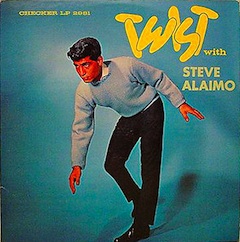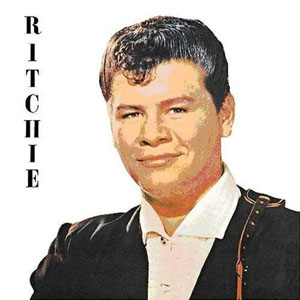
"This Little Girl's Gone Rockin" is a 1958 rhythm and blues single performed by Ruth Brown and released on Atlantic Records as Atlantic 1197 in the week of August 25. The song was written by Bobby Darin and Mann Curtis. It reached number 24 in Billboard's pop charts. [1]
Rhythm and blues, commonly abbreviated as R&B, is a genre of popular music that originated in African American communities in the 1940s. The term was originally used by record companies to describe recordings marketed predominantly to urban African Americans, at a time when "urbane, rocking, jazz based music with a heavy, insistent beat" was becoming more popular. In the commercial rhythm and blues music typical of the 1950s through the 1970s, the bands usually consisted of piano, one or two guitars, bass, drums, one or more saxophones, and sometimes background vocalists. R&B lyrical themes often encapsulate the African-American experience of pain and the quest for freedom and joy, as well as triumphs and failures in terms of relationships, economics, and aspirations.

In the music industry, a single is a type of release, typically a song recording of fewer tracks than an LP record or an album. This can be released for sale to the public in a variety of different formats. In most cases, a single is a song that is released separately from an album, although it usually also appears on an album. Typically, these are the songs from albums that are released separately for promotional uses such as digital download or commercial radio airplay and are expected to be the most popular. In other cases a recording released as a single may not appear on an album.

Ruth Alston Brown was an American singer-songwriter and actress, sometimes known as the "Queen of R&B". She was noted for bringing a pop music style to R&B music in a series of hit songs for Atlantic Records in the 1950s, such as "So Long", "Teardrops from My Eyes" and "(Mama) He Treats Your Daughter Mean". For these contributions, Atlantic became known as "the house that Ruth built".
It was later covered by Glenda Collins, but her version remained unissued until the 1990s. Similarly Alma Cogan recorded it in 1958, but this was also unissued at the time. A version by Janice Peters was released in the UK in 1958 but was not a hit. [2]
Glenda Collins is a former British pop music singer active in the 1960s. Collins was discovered by Carroll Levis, whose promotion landed her a contract with Decca Records. She released three singles through Decca which failed to chart and was dropped by the label.

Alma Angela Cohen, known professionally as Alma Cogan, was an English singer of traditional pop music in the 1950s and early 1960s. Dubbed the "Girl with the Giggle in Her Voice", she was the highest paid British female entertainer of her era.
In 2006, Hummer used the song in one of their H3 commercials. Rosie Flores covered the song on her 2009 album Girl Of The Century recorded with The Pine Valley Cosmonauts released on Bloodshot Records.

Hummer was a brand of trucks and SUVs, first marketed in 1992 when AM General began selling a civilian version of the M998 Humvee. In 1998, General Motors (GM) purchased the brand name from AM General and marketed three vehicles: the original Hummer H1, based on the military Humvee, as well as the new H2 and H3 models that were based on smaller, civilian-market GM platforms.

The Hummer H3 is an off-road vehicle that was produced from 2005 to 2010 by General Motors. The smallest model of the Hummer lineup, it was offered as a 5-door SUV or a 4-door pickup truck known as the H3T. Unlike the larger H1 and H2 models, the H3 was not developed by AM General. It was introduced for the 2006 model year, based on a modified GMT355 that underpinned the Chevrolet Colorado/GMC Canyon compact pickup trucks that were also built at GM's Shreveport Operations in Shreveport, Louisiana and the Port Elizabeth plant in South Africa. While mechanically related to the Colorado and Canyon, GM claims they share only 10% of their components, with the chassis modified and reinforced for heavy off-road duties.

Rosie Flores is a rockabilly and country music artist. Her music blends rockabilly, honky tonk, jazz, and Western swing along with traditional influences from her Tex-Mex heritage. She currently resides in Austin, Texas, where August 31 was declared Rosie Flores Day by the Austin City Council in 2006.






